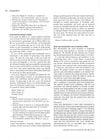 86 citations,
January 2008 in “Journal of nutritional & environmental medicine”
86 citations,
January 2008 in “Journal of nutritional & environmental medicine” Green tea may help with health issues like cancer, heart disease, and weight loss due to its high catechin content.
 47 citations,
November 2021 in “Advanced Functional Materials”
47 citations,
November 2021 in “Advanced Functional Materials” The new hydrogel dressing with natural molecules helps heal wounds faster and improves skin repair.
45 citations,
January 2016 in “Journal of Nanomaterials” Silver nanoparticles from Ziziphus nummularia leaves have better antibacterial, antifungal, antioxidant, and hair growth effects than the leaf extract alone.
 31 citations,
October 2020 in “Journal of nanomaterials”
31 citations,
October 2020 in “Journal of nanomaterials” Silver nanoparticles made from Grewia optiva leaf extract show strong antibacterial, antioxidant, and hair growth benefits.
31 citations,
November 1986 in “Journal of the American Academy of Dermatology”  21 citations,
January 2019 in “Elsevier eBooks”
21 citations,
January 2019 in “Elsevier eBooks” Green-synthesized nanoparticles can effectively target cancer cells, reducing side effects and improving treatment.
 20 citations,
July 2015 in “Journal der Deutschen Dermatologischen Gesellschaft”
20 citations,
July 2015 in “Journal der Deutschen Dermatologischen Gesellschaft” Green tea may help with skin health and protect against UV damage, but more research is needed to confirm its safety and effectiveness.
19 citations,
July 2009 in “PubMed” Green tea extract for hair loss may cause liver damage.
 19 citations,
January 2007 in “Journal of medical investigation”
19 citations,
January 2007 in “Journal of medical investigation” GFP transgenic mice help study cell origins in skin grafts.
 15 citations,
March 1997 in “International Journal of Dermatology”
15 citations,
March 1997 in “International Journal of Dermatology” Selenium sulfide in anti-dandruff shampoos can turn hair green.
 14 citations,
November 2020 in “International Journal of Biological Macromolecules”
14 citations,
November 2020 in “International Journal of Biological Macromolecules” Mushroom-based scaffolds help heal skin wounds and regrow hair.
 13 citations,
December 2017 in “BMC Complementary and Alternative Medicine”
13 citations,
December 2017 in “BMC Complementary and Alternative Medicine” The Asian herbal mix with Houttuynia cordata, Perilla frutescens, and green tea helped grow hair in mice.
10 citations,
January 1980 in “Ultrastructural pathology” Green hair has high copper levels due to contaminated water and damaged hair cuticles.
8 citations,
January 2012 Green tea polyphenols are beneficial for various skin and hair conditions and are increasingly popular in cosmetics.
 5 citations,
January 2013 in “PubMed”
5 citations,
January 2013 in “PubMed” Green tea may help with various skin conditions and protect the skin when taken orally or applied topically, but its effectiveness is not always proven.
4 citations,
June 2022 in “Journal of cleaner production” New eco-friendly method strengthens and sets hair using light and causes less damage.
4 citations,
May 2016 in “PubMed” Green tea hair tonic safely and effectively reduces scalp greasiness.
3 citations,
January 2014 Green tea extract hair tonic is stable at room temperature, promotes hair growth better than minoxidil, and is safe for use.
 3 citations,
June 2009 in “The journal of alternative and complementary medicine/Journal of alternative and complementary medicine”
3 citations,
June 2009 in “The journal of alternative and complementary medicine/Journal of alternative and complementary medicine” Green tea extract may help reduce excessive hair growth.
 2 citations,
August 2022 in “Korean journal of medicinal crop science/Han-gug yagyong jagmul hag-hoeji”
2 citations,
August 2022 in “Korean journal of medicinal crop science/Han-gug yagyong jagmul hag-hoeji” BLH308, made from persimmon leaf, green tea, and sophora fruit, may help reduce hair loss by fighting oxidative stress and inflammation.
 1 citations,
November 2023 in “Journal of cosmetic dermatology”
1 citations,
November 2023 in “Journal of cosmetic dermatology” The new anti-dandruff shampoo with ketoconazole-coated zinc oxide nanoparticles is more effective against dandruff.
1 citations,
March 2022 in “Protection convergence” Fermented green coffee beans may be good for scalp and hair health cosmetics.
 1 citations,
December 2006 in “Annals of the New York Academy of Sciences”
1 citations,
December 2006 in “Annals of the New York Academy of Sciences” Green algae can break down finasteride, reducing environmental harm.
 October 2024 in “Photodermatology Photoimmunology & Photomedicine”
October 2024 in “Photodermatology Photoimmunology & Photomedicine” Red LED therapy is more effective than green LED for improving hair growth in androgenetic alopecia.
December 2023 in “International Journal of Health and Pharmaceutical” Green betel leaf extract cream helps improve hair growth and health.
 November 2023 in “Advanced functional materials”
November 2023 in “Advanced functional materials” Magnesium Silicate Sprays help heal burn wounds and regrow skin features better than commercial products.
 November 2023 in “Journal of Basic Microbiology”
November 2023 in “Journal of Basic Microbiology” Green-synthesized zinc oxide nanoparticles effectively inhibit common fungi found on human scalp hair.
 August 2023 in “Skin Research and Technology”
August 2023 in “Skin Research and Technology” BLH308, with persimmon leaf, green tea, and sophora fruit extracts, safely increased hair density and thickness.
 July 2023 in “International journal of research publications”
July 2023 in “International journal of research publications” Green coffee bean extract didn't grow hair but reduced a hair loss-related enzyme in rats.
 January 2023 in “International Journal of Multidisciplinary Research and Growth Evaluation”
January 2023 in “International Journal of Multidisciplinary Research and Growth Evaluation” Green tea might help manage hair loss from androgenetic alopecia.




















